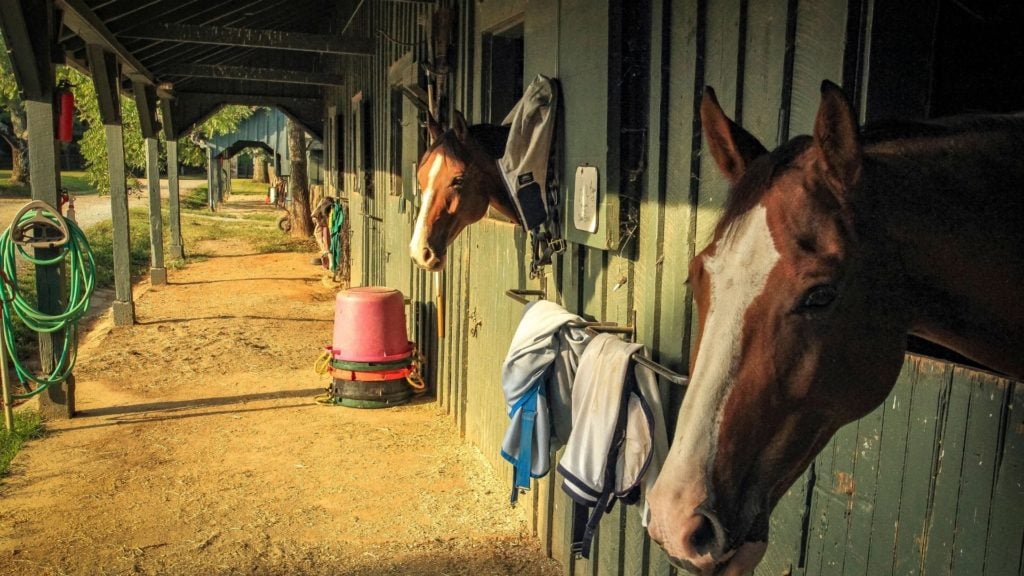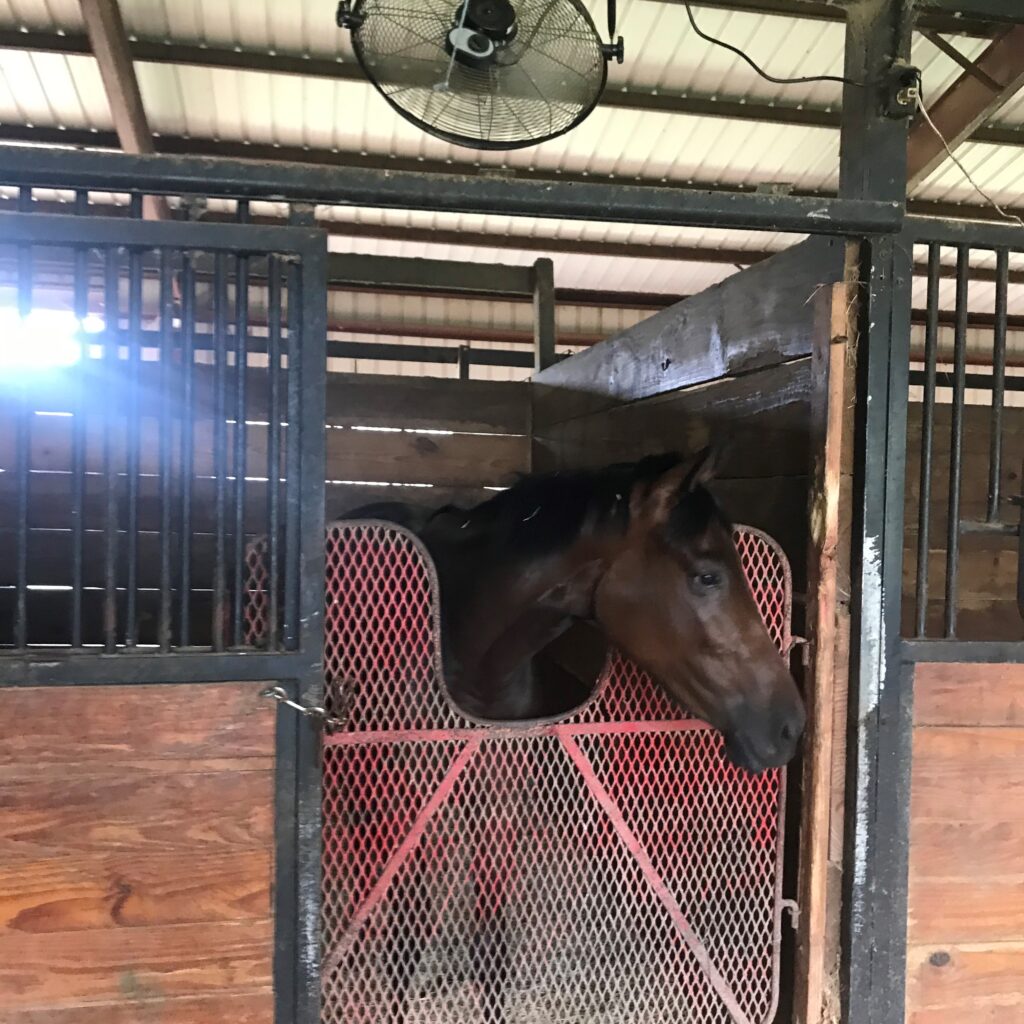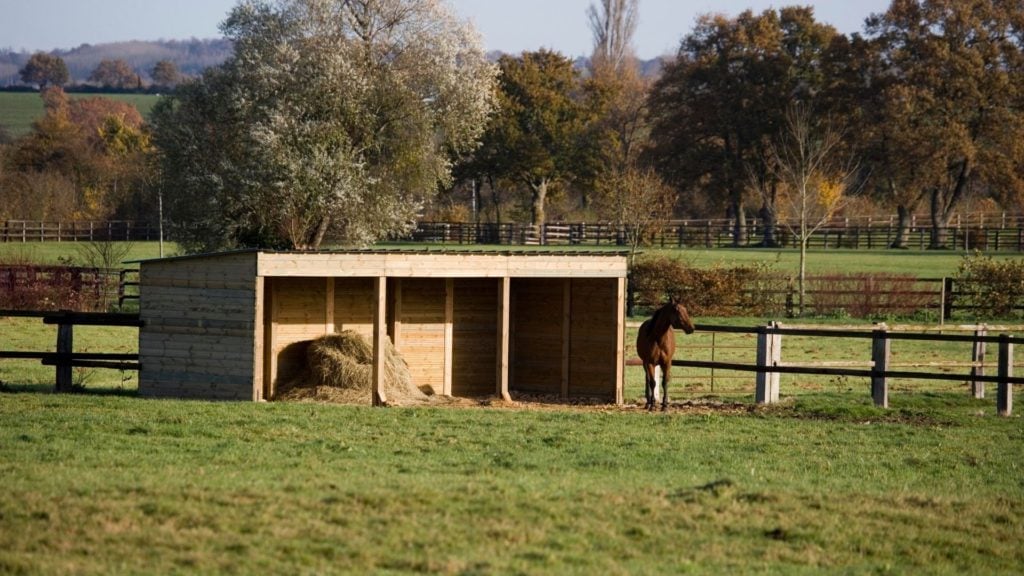Last updated: June 2, 2022
I stable some horses every night, and others I rarely put in a stall. My procedure gave rise to my neighbor asking me, “when should a horse be stabled at night, and when should they be left out.”
Some horse should be stabled at night, ones you’re getting ready to show, have diet restrictions, medical conditions, or thin coats, are likely candidates. But it’s essential to treat horses as individuals and consider their unique circumstances before deciding when and for how long to stable them.
Horse owners often stable their horses at night. But they usually do this because of habit and it isn’t always necessary or in their animal’s best interest.

Should you stable your horse at night?
While it looks like a yes or no question, it actually isn’t. There are quite a few “it depends” to consider. Several questions need to be answered to make that decision.
After the decision is made, there are still things to consider. That is true even if the answer about stabling is a no.
Where you live plays a role.
In the southern parts of the country, especially the southwest, you may not need to stable your horse at night. The weather rarely gets cold enough to call for a true stable. In the mountains, that’s another story. Some mountainous regions can be extremely frigid in the winter, with plenty of snow.
If you live in the northern parts of the country or live in places where there are thunderstorms, tornadoes, and hurricanes, putting your horse in a stall may be necessary. It is also more likely to snow in those regions.
Could a horse stay out in such weather? Horses tolerate the cold well; however, there are times the temperature drops below safe conditions, and it probably isn’t in the animal’s best interest to leave it outside.

Consider your horse’s coat.
When daylight hours are getting shorter, your horse will start to grow in its winter coat. If it’s thick and luxurious, staying out may be an option. This is particularly true if there’s a good blanket for it, although sometimes a blanket can make a horse colder than not having one.
If you decide to use a blanket to keep your horse warm, it should be checked daily. To learn more about horse blankets, read my article: Why Do Some Horses Wear Blankets? Even in the Summer? I cover a lot of common questions people ask.
If the horse’s winter coat is thin, it may not handle colder outdoor temperatures. There are many reasons it might be thin; coats in the country’s southern tier are particularly likely to be thinner, as the days are longer there.
Horses are stabled when prepping for a show or sale.
Owners often want to keep their horses’ coats slick even in the winter, mainly show horses. Maintaining a short coat requires limiting the animal’s exposure to cold temperatures.
Specific breeds of horses, such as Arabians and Akele Teke, never grow a thick coat, and an older horse or one who is ill may not grow in a good winter coat. Horses may also just have an off year for a good coat.
That doesn’t mean it necessarily has to be stabled, but it is a significant consideration. You would have to go back to the first question. Does the weather in your area allow for a horse to be outside in the winter? Does it spook at thunder and lightning? Is the animal in prime condition or in need of plenty of TLC?

Your horse’s temperament and physical condition are factors.
Each horse is different, just like each human. Some of it is a breed variation, but a lot of it is the individual horse. If you have several, you may know that one of them likes to be outside, no matter the weather, and another would prefer to be out of the wind and rain.
Sick horses may need stall time.
While the individual horse’s personality should be considered, it isn’t as important as a few other factors. Older horses and those who are ill are likely to need to be in a stable at night, especially if the weather is terrible.
A sick horse may require medical care, and it’s hard to do some treatments in a pasture. The older horse may need to be kept warm and dry so it doesn’t become ill. These are more important than the horse’s preference.
Some horses are kept in a stall to restrict their diet.
Some horses are easy keepers; this means they maintain or put on weight eating only grass. Easy keepers are often a blessing, but some are chronically overweight.
For horses that need a restrictive diet, you may want to get them off the grass and in a stable overnight.
If you’ve just moved, stabling at night may help the transition. It takes time for a horse’s digestive system to get used to new grass or hay from a new area. They will be a little off until they get used to it, and keeping them warm and dry will help with the digestive issues that come up under those circumstances.

Unfavorable land conditions.
Is the ground muddy? Is it likely to get muddy overnight? What about ice? The condition of the land can have an impact on your horse’s overall health. Mud can cause illness in horses, and the reason for the sloppy conditions is usually lousy weather.
Mud and ice aren’t all that great for the human caretaker, either. Whether the mud is from sandy soil like in the southwest or clay soil in the more northern parts of the country, it is a significant consideration.
Your circumstances are essential.
As the owner, you need to know what you are most comfortable with. Do you live somewhere safe enough to leave your horse out all night, or is something likely to happen?
Are you comfortable with the idea of getting up to check on them in the middle of the night should something happen, or would you rather that the checking be in a warm barn? If something that could happen involves other humans with nefarious plans, would a locked barn be wiser?
Your horse is likely better suited in a pasture if your facility is unclean, unsafe, or not well ventilated.
If you choose to stable your horse
There are things to consider here that are as important as the decision to stable. Horses don’t sleep all night. In fact, they only sleep around four hours in a twenty-four-hour period.
Therefore, the horse must have something to do to while away the time. Bored horses can get into all kinds of mischief, even in a stable.
Horses are herd animals. It’s best if there’s more than one horse in the barn and that they are side by side. They are social animals; they like to communicate with a companion animal, even if it isn’t another equine.
Going the stable route would be wisest if there was at least another bonded companion animal with your horse.

If you choose pasture over stable
Here you may need to consider adding a shelter for the horse. If it gets windy or cold, it can get protection from the elements, and when it’s scorching, the horse can use it for shade.
The standard run-in shelter design has a roof and three sides, so a horse is free to come and go as it wishes but has the option. In our area, these types of runout sheds are considered temporary buildings and don’t require permits.
Naturally, you could choose to build a permanent type of shelter, although that may require building permits. You will have to check with the city and county before construction. Even then, your horse will need a companion animal… although not because of boredom.
Conclusion
There is no one right answer to the question of whether or not to stable a horse at night. It takes all of these considerations to come to the correct conclusion for you and your animals.
Below is a YouTube video about stabling a horse at night.
Related articles:
- Should You Tie a Horse in a Trailer? the Pros and Cons
- Should a Horse Be Ridden Every Day? the Pros and Cons
- Step-By-Step: How to Prepare a Horse for a Long Trip
- How to Move a Horse Into a New Home: The Complete Guide
- Can You Ride a Barefoot Horse on the Road? 10 Tips
- Best Weight Distributing Hitches for Horse Trailers
- How, Why and When Horseshoes Need to Be Changed
Resources
- https://www.horseandhound.co.uk/features/when-to-bring-your-horse-in-at-night-411801
- https://www.equinebehaviourist.co.uk/blog/2015/10/22/44p6v4bzehizbqnf8eq395pqnjzhai
- https://www.nationalstables.co.uk/blog/should-your-horse-be-stabled-at-night

About the Author: Miles Henry
Lifelong Horseman | Racehorse Owner | Published Author
Miles Henry brings over 25 years of hands-on experience training and owning Thoroughbred racehorses. Raised with Quarter Horses and Appaloosas, he’s spent a lifetime learning from horses—on the track, in the barn, and in the field. Today, he runs a small but successful racing stable in Louisiana and shares real-world insights on HorseRacingSense.com, helping horse owners, fans, and bettors navigate the sport with confidence.
📚 Books: View Miles’s books on Amazon »
🎧 Podcast Guest: Animal Tales Ep. 32 |
YouTube Interview
📩 Newsletter: Sign up for racing tips and horse care advice »
🔗 Follow Miles:
Twitter |
Facebook |
YouTube


